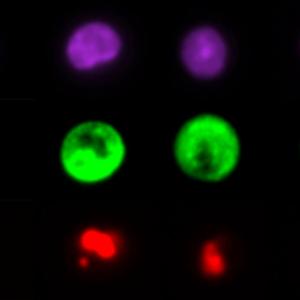New study details key mechanisms of T-cell proliferation
30 Oct 2024
In T cells responding to pathogens, mTORC1 and ribosomal biogenesis regulate each other.
30 Oct 2024
In T cells responding to pathogens, mTORC1 and ribosomal biogenesis regulate each other.

© R. Obst / LMU
A research team led by PD Dr. Reinhard Obst has published new findings on the molecular mechanisms that control the proliferation of activated T cells, which play a vital role in the immune system’s response to threats such as viruses and infections. His group focused on the role of the multiprotein complex mTORC1, a multiprotein complex known for its involvement in cell growth, and its impact on ribosomal biogenesis and T cell receptor (TCR) signaling. The study is published in the latest issue of the journal “Science Signalling” (October 2024).
Activated T cells must rapidly increase protein production to support their fast-paced growth and division. This process relies on ribosomes, which are produced in a specific part of the cell known as the nucleoli. The study highlights the importance of mTORC1 in regulating ribosome production, showing that it is essential for the fast cell cycling required by activated T cells.
The team found that mTORC1 boosts the sensitivity of T cells to antigens, the substances that trigger immune responses, and promotes the production of ribosomal RNA which is necessary for making new ribosomes. Additionally, mTORC1 increases both the number and size of nucleoli, where ribosomes are synthesized. These effects were not observed with the related protein complex mTORC2, emphasizing the specific role of mTORC1 in T cell proliferation. “Our research demonstrates how mTORC1 plays a crucial role in coordinating TCR signaling and ribosomal RNA production, both of which are necessary for T cells to multiply effectively,” said PD Dr. Obst. “The findings suggest that mTORC1 is a key regulator of the cellular machinery needed for protein synthesis during the rapid division of activated T cells.”
The study uncovered also a link from ribosomal RNA transcription back to mTORC1 activity, pointing to a two-way regulatory relationship between cell signaling pathways and the internal processes that allow T cells to proliferate in response to antigens. These insights into the molecular regulation of T cell proliferation deepen the understanding of the immune system function.